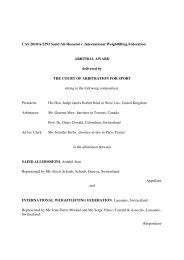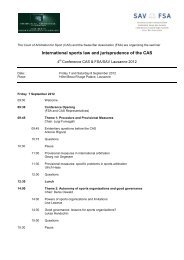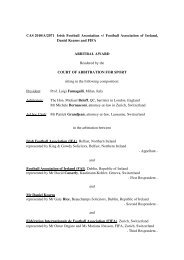(CAS) Bulletin - Tribunal Arbitral du Sport / TAS
(CAS) Bulletin - Tribunal Arbitral du Sport / TAS
(CAS) Bulletin - Tribunal Arbitral du Sport / TAS
You also want an ePaper? Increase the reach of your titles
YUMPU automatically turns print PDFs into web optimized ePapers that Google loves.
The Appellant argues that the IFA award is not<br />
recognizable in Switzerland on the basis of Article<br />
V, paras. 1(b) and 1(d), of the New York Convention.<br />
The Appellant contends, in reference to lit. (b), that<br />
the IFA Arbitrator decided ex parte without examining<br />
the Appellant’s evidence on the merits of the case<br />
and, in reference to lit. (d), that the composition of<br />
the IFA arbitral tribunal and the arbitral proce<strong>du</strong>re<br />
adopted by the latter were not in accordance with the<br />
agreement of the parties.<br />
With respect to Article V, para. 1(b) of the New York<br />
Convention, the Panel notes that the Appellant was<br />
given ample opportunity by the IFA Arbitrator to<br />
present his case on the merits, even postponing the<br />
deadline to fi le his submission and the hearing date.<br />
It is clear from the IFA Arbitrator’s award that, in<br />
such arbitral forum, the Appellant chose (i) to defend<br />
himself only on a proce<strong>du</strong>ral basis, (ii) not to submit<br />
any evidence or arguments on the merits, and (iii) not<br />
to attend the hearing. Accordingly, on the basis of the<br />
evidence on fi le, the Panel fi nds that the Appellant<br />
was given proper notice of the appointment of the<br />
arbitrator and of the arbitration proceedings and was<br />
given ample opportunity to present his case. This<br />
Appellant’s argument based on Article V, para. 1(d)<br />
of the New York Convention thus fails.<br />
Then, the Panel observes that both Appellant’s<br />
contentions based on Article V, para. 1(d), of the<br />
New York Convention unequivocally rest on the<br />
assumption that the parties had not agreed to<br />
refer their dispute to the IFA Arbitration Institute.<br />
However, the Panel found that the IFA Arbitration<br />
Institute did have jurisdiction based on the agreement<br />
of the parties.<br />
As a result, the Panel fi nds that the composition of<br />
the IFA arbitral tribunal (i.e. the appointment of a<br />
sole arbitrator) and the arbitral proce<strong>du</strong>re followed<br />
by the IFA Arbitrator were in accordance with the<br />
agreement of the parties. Indeed, Article 14.2 of<br />
the Israeli Agents Regulations, which has been<br />
contractually binding for both parties since the<br />
respective moments when they deliberately registered<br />
with the IFA, provide that “arbitration proceedings shall<br />
be con<strong>du</strong>cted in accordance with all the provisions contained<br />
in the Arbitration Institute’s articles”. The Panel observes<br />
that this is what normally happens in arbitration<br />
when an arbitration institution is chosen: the parties<br />
are automatically bound to follow the proce<strong>du</strong>ral<br />
rules of that arbitration institution.<br />
The Panel remarks that the Appellant does not<br />
contend that the IFA Arbitration Institute did not<br />
compose the arbitral authority in accordance with its<br />
own rules or that the IFA Arbitrator did not follow<br />
the IFA Arbitration Institute’s proce<strong>du</strong>ral rules.<br />
The Appellant rather complains about the noncompliance<br />
of the arbitral authority and the arbitral<br />
proce<strong>du</strong>re with the FIFA-PSC rules, resting on the<br />
underlying premise that the parties had agreed to<br />
submit the dispute to the FIFA-PSC and not to the<br />
IFA Arbitration Institute. As the premise is fallacious,<br />
the Appellant’s argument based on Article V, para.<br />
1(d) of the New York Convention is bound to fail.<br />
E. Possible recognition under Article V, para. 2,<br />
of the New York Convention<br />
Article V, para. 2, of the New York Convention sets<br />
forth further reasons why an arbitral award may not<br />
be recognized:<br />
“ 2. Recognition and enforcement of an arbitral award may<br />
also be refused if the competent authority in the country<br />
where recognition and enforcement is sought fi nds that:<br />
(a) The subject matter of the difference is not capable<br />
of settlement by arbitration under the law of that<br />
country; or<br />
(b) The recognition or enforcement of the award would<br />
be contrary to the public policy of that country ”.<br />
The Appellant did not invoke Article V, para. 2 of<br />
the New York Convention at all. The Panel notes,<br />
however, that the requirements set forth by Article V,<br />
para. 2, must be checked ex offi cio.<br />
As to lit. (a), the Panel notes that in Switzerland all<br />
matters having a pecuniary character, such as the<br />
present one, are capable of being solved through<br />
arbitration (Article 177.1 PILA).<br />
As to lit. (b), the Panel cannot see how the recognition<br />
and enforcement of the IFA Arbitrator’s award,<br />
which has stated that the Player owes no money to<br />
the Agent, could in any possible way breach Swiss<br />
public policy.<br />
As a result, Article V, para. 2 of the New York<br />
Convention might not impede the recognition of the<br />
IFA Arbitrator’s award in Switzerland.<br />
F. The letter allegedly signed by the Player<br />
on 2 June 2008<br />
The Appellant also argues that the Panel should<br />
disregard the IFA Arbitrator’s award, and should<br />
thus reject the res judicata exception, because the<br />
Respondent signed a letter on 2 June 2008 by which<br />
he recognized that he owed the Agent […] USD as<br />
commission fee for his transfer from AIK Solna to<br />
Jurisprudence majeure / Leading cases<br />
-<br />
73





